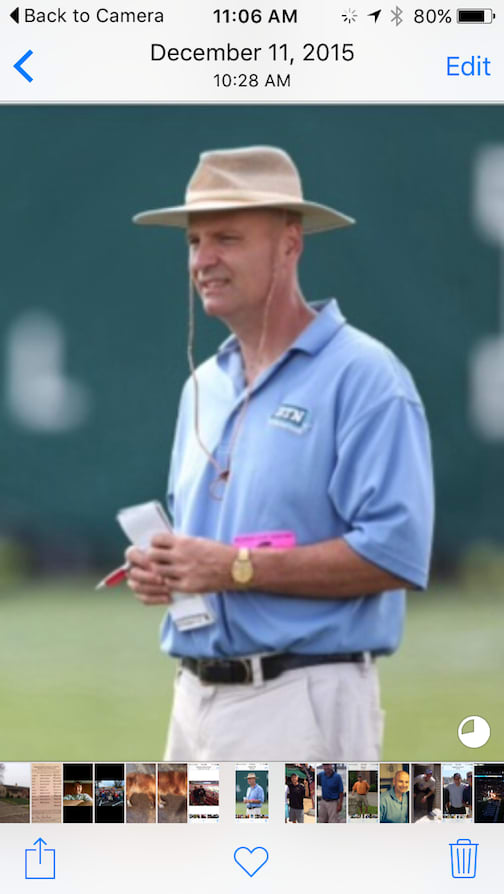
MORE: Training camp coverage
Every time J.D. Dellinger walks into Purdue’s Kozuch Football Performance Complex, it happens: He gets tested.
That’s the new normal for the Boilermakers’ fifth-year senior kicker—and for all Big Ten football players and staffers—as the program pushes forward trying to play a 2020 season amid a pandemic. There are football games to be played--and money to be made. And those things won’t happen if myriad players are forced to the sideline by COVID-19.
“Every day before practice, you come to the lobby,” said Dellinger. “… and they have a whole testing station there. You walk up and you get this rapid test, and you just stick it up your nose, do the swirls for however long they tell you to do it. Then, you get (results) back within 30 minutes …
“You're clear and unless they come get you.”
Players typically go from being tested to position meetings.
“We have meetings for over an hour after you get tested,” said Dellinger. “If you get here early enough, you could theoretically get your test back before meetings even start. So, you're not going to be really in (with) the general team, you'll just be in your specific position group, I guess. But, you will 100 percent get your test results back before anyone goes out there to practice.”
When the Big Ten announced on Sept. 16 that it would play a 2020 season beginning Oct. 23-24, the conference also introduced stringent health and safety protocols. Those were key to the Big Ten feeling comfortable playing this fall after initially postponing the season on Aug. 11. Purdue opens the season at home on Oct. 24 vs. Iowa.
The Big Ten requires players, coaches, trainers and other personnel connected to the team that are on the field for all practices and games to undergo daily antigen testing. The daily testing eliminates contact-tracing, which can debilitate a roster and cause games to be called off.
"I do think it's good," said Purdue junior running back Zander Horvath. "There's not contact tracing anymore since we're getting tested every day.
“And I think we know within like 20 minutes after you get your results back, too. So, I think what they're doing is very good. I mean, it's keeping us all healthy and keeping us from going out and getting COVID. So, I mean, overall, it's a good process. It’s going to help us in the long run.”
Daily test results must be completed and recorded prior to each practice or game. Players who test positive for the coronavirus through daily testing require a follow up test to confirm diagnosis. It’s a process that comforts players knowing they are working in as safe an environment as can be provided.
“I would say it does,” said senior linebacker Derrick Barnes. “It makes me want to stay even more. It has eased us, especially knowing that (testing is) every day. I think it's great. Being tested every week was good and now we're gonna test every day. It's just a more positive vibe.”
If a player does test positive, he must undergo comprehensive cardiac testing and then be cleared by a cardiologist. The earliest a player can return to competition is 21 days following a COVID-19 positive diagnosis.
Story continues below photo
Other leagues already have encountered issues with the coronavirus, causing many games to be postponed. The SEC, Big 12 and ACC--Power Five conferences like the Big Ten--all have seen games postponed because of COVID-19 infections.
Schools hope to reschedule games postponed by the virus. And built-in off weeks allow for schedule flexibility. But the Big Ten has no such schedule dexterity. League schools are slated to play nine games in nine weeks from Oct. 23-24 to Dec. 18-19—championship weekend. There is no wiggle room.
Coaches have to make sure everyone is ready to play, a task made easier knowing the NCAA has issued a blanket waiver making this a "free" year of eligibility for players.
"You've got to be able to have the next guy step up and they've got to do their job so you know whoever may think they're the starter now we've got to get the backup (ready)," said Jeff Brohm, "the third-team guy ready and everybody has to play the role, so that we can get through, have the most successful season we can."
Even though the Big Ten has no open dates for rescheduling purposes, Horvath is confident the conference can pull off a season because of its testing procedures.
“Yeah, it does,” said Horvath. “I mean, before any of this was happening, I kind of thought there's a big chance that if one person got it in the room, you might lose a whole room and you're gonna kind of change your game plan. But since they've been doing the testing every day, I think it's gonna be very beneficial and just keep players from getting knocked out … “
The players also must do their part when they are away from the football facility. That means wearing a mask and adhering to university and community health standards.
“At the end of the day, people are gonna do what they want to do,” said Barnes. “If you want to play, you have to put yourself in a position to play … “
Membership Info: Sign up for GoldandBlack.com now | Why join? | Questions?
Follow GoldandBlack.com: Twitter | Facebook | YouTube
More: Gold and Black Illustrated/Gold and Black Express | Subscribe to our podcast
Copyright, Boilers, Inc. 2020. All Rights Reserved. Reproducing or using editorial or graphical content, in whole or in part, without permission, is strictly prohibited.
